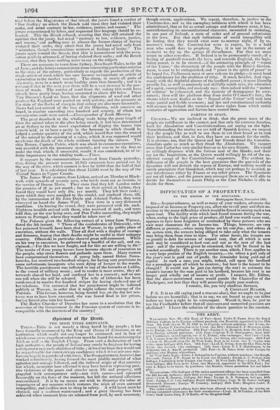apininttd of the pre#1.
THE IRISH TITHE GRIEVANCE.
Tangs—Tithe is not merely a thing bated by the people ; it has been formally denounced by the King and House of Commons, as an institution xvlach could not any longer be continued, and in lieu of which some more expedient substitute must be found for maintaining the Irish as well as the English Clergy. From such a declaration of such high authorities, the people of Ireland may surely he forgiven for having anticipated a very early abolition of tithe ; at least we hope they would not be unpardonable for entertainiuga confidence which it was our own mis- fortune largely to partake of with them. The disappointment, however,has worked calamitously, having formed the most prolific material of what agitation and outrage followed, and the indirect origin of that coercive law which, no matter how effectual it may have been in repressing posi- tive violations of the peace and attacks upon life and property, still grappled with consequences only—not with causes—and operated favourably on the fears of the moment, but left the national affections unconciliated. It is by no means our wish to disparage the value or importance of any measure which restores the reign of even outward tranquillity, and enables men to sleep in safety. A wild beast must be chained, and a madman waistcoated ; and a great blessing has been achieved When innocent lives are released from peril, by such necessary, though severe, applications. We repeat, therefore, in justice to the Coercion-law, and to the exemplary mildness with which it has been adminiatered, that so far as actual outrage and disturbance went, it has, notwithstanding its unconstitutional character, succeeded in restoring, in one part of Ireland, a state of order and of general submission to the laws. But that such indications of social tranquillity will be lasting, that they would exist over to-morrow night, if by to- morrow's noon, the Coercion-law were to expire, he is a bold man who could dare to prophesy. No ; it is not in the nature of restraint to dry up the springs of disturbance. For that we must resort to other remedies. If Ireland is to be permanently cured—if a feeling of goodwill towards tine laws, and towards England, the legis- lating power, is to be created,—if the animating principle of " repeal of the Union," the discontent of the people with the British Govern- ment, is ever to be extinguished, and " peace in the spirit of peace" to be hoped for, Parliament must at once redeem its pledge—it must head the confederacy for the-abolition of tithe. It must, besides, deal vigo- rously with the frightful abuses of the landlord power; it must liberally provide for, as well as anxiously and skilfully watch over, the education of a quick, susceptible, and unsteady race : then indeed will the " matter of sedition" be exhausted, and the dynasty of demagogues be over- turned ; then will the platform drop from under O'Connell's feet ; the shouts which now deafen us for " Repeal of the Union" will sink into some partial and feeble murmurs ; and law and constitutional authority will assume in Ireland the exercise of those rights from which entire centuries of oppression and faction have ousted them.
PARTIES 1N SPAIN.
COURIER— We are inclined to think, that the great mass of the people are indifferent to the contest, and that only the extreme fanatics, both for Absolutism and Constitutionalism, are urging on the fight. Notwithstanding the stories we are told of Spanish knives, we suspect that the people like as well to use them to cut their bread as to stab their brethren, and that, in fact, they have no stomach for the strife. It is obvious, too, that time Queen and her friends dread the Constitu- tionalists quite as much as they dread the Absolutists. We suspect even that Carlos has very similar fears as to his own friends. Ile would as willingly dispense with the furious zeal of the Monks, and their cry for the Inquisition, as the Queen would willingly be rid of the ex- uberant energy of her Constitutional supporters. The evident in- difference of the people is the best guarantee that the quarrels of the dynasties will not disturb the repose of Europe, and nothing would so surely precipitate that bloodshed, which may yet perhaps he avoided, as any interference either by France or any other power. The Spaniards are not all babies, and the grown men amongst them are as well able to decide for themselves as Louis Philip or the Czar Nicholas is able to decide for them.


















 Previous page
Previous page